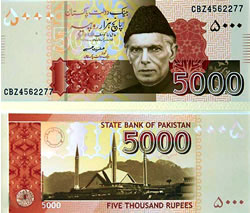Pakistan rupee falls to 70 to dollar on foreign currency export ban
Karachi - The Pakistani rupee saw its biggest fall in five years Friday, hitting 70 to the US dollar after the central bank imposed an export ban on euros and other foreign currencies, dealers said.
The Pakistani rupee saw its biggest fall in five years Friday, hitting 70 to the US dollar after the central bank imposed an export ban on euros and other foreign currencies, dealers said.
"There is virtual panic everywhere in the market," said treasury dealer Ali Kadir at Invest Cap Securities.
The rupee hit 70/70.10 (buying/selling) in an unofficial open market against the dollar, compared with 67.50/67.80 Thursday.
On the interbank market, the rupee traded at 69.60/69.80, compared with 67.08/67.20 Thursday.
The central State Bank of Pakistan on Friday imposed bans on exports of euros, pounds and United Arab Emirate dhirams by foreign exchange companies. These companies used hard currencies to buy US dollars abroad.
"We have taken this decision to stop the flight of capital," said Wasim Ahmed, a central bank spokesman.
The move came on the heels of a meeting Thursday chaired by bank Governor Shamshad Akhtar with top executives of foreign exchange companies in which she warned them to stop speculating after the rupee's nearly 10-per-cent fall in the past two months.
Akhtar told executives that the difference between the open market rates and the interbank rates should be within 50 to 60 paisas, not about 2 rupees as has been witnessed in the past couple of weeks.
The foreign exchange export ban created panic in the market, and dealers said the US dollar was not available even at 70 rupees.
"There is a severe shortage of dollars on the market," said Nabeel Iqbal, marketing manager at Khanani and Kalia, Pakistan's largest foreign exchange firm.
Meanwhile, the latest foreign exchange reserves position showed the central bank had lost another 400 million dollars last week on rising imports, holding 12.2 billion dollars last week, compared with 12.65 billion dollars a week earlier.
With the new figures, the central bank has so far lost more than 4.5 billion dollars during the past five months from a peak of
16.48 billion in October last year.
Rising oil import costs are considered the chief reason for eroding reserves, coupled with domestic food shortages and low exports. (dpa)